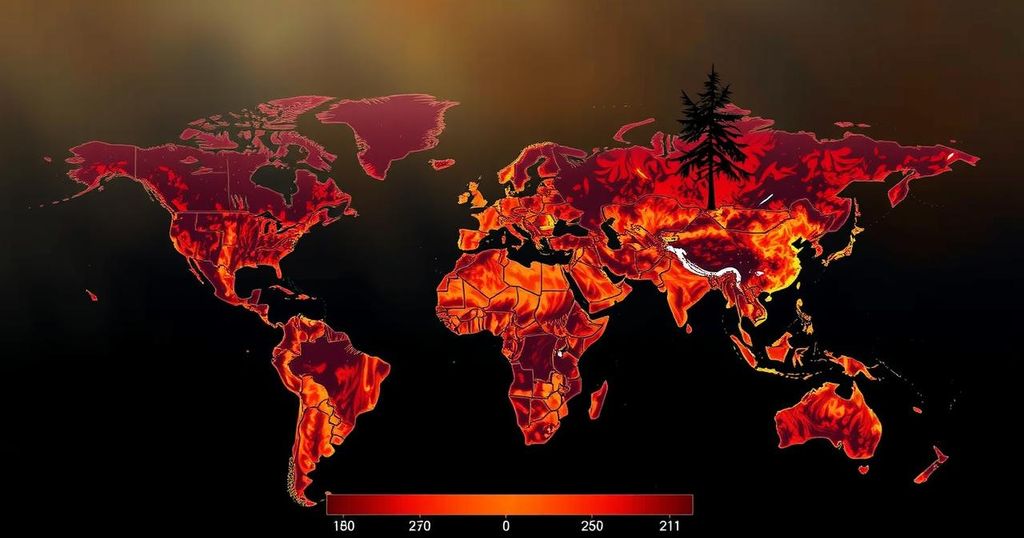Impact of Climate Change on Global Wildfire Frequency and Human Health

Research has revealed a direct link between climate change and the escalation of global wildfires, contributing to a significant increase in smoke-related deaths, from fewer than 669 annually in the 1960s to 12,566 in the 2010s. Studies from various universities indicate that while human interventions can have some dampening effects, they are often insufficient against the stronger influences of climate change, especially in extreme weather years.
Recent research has established a direct correlation between climate change and the rising occurrence and intensity of wildfires globally, with consequential effects on human health reflected in increased mortality due to smoke inhalation. Two separate research initiatives led by teams from Dalhousie University, Belgium, the United Kingdom, and Japan, focused on the patterns of wildfires and their implications for human health, revealing deteriorating outcomes across the board. The data indicate a stark increment in smoke-related fatalities, from fewer than 669 annually in the 1960s to approximately 12,566 in the 2010s. A significant study recently published in Nature Climate Change compared wildfire models that accounted for climate change impacts against those that did not. The findings underscored a pronounced escalation in wildfire frequency and intensity, particularly in sensitive environments such as the African savannas, Australia, and Siberia. However, a noteworthy decline in wildfires was observed in Africa—responsible for nearly 70 percent of the global burnt area—attributed to increased human activities and fragmented land, which hinder fire propagation. In contrast, areas with dense vegetation, notably California and Siberia, are witnessing more frequent fires, primarily due to prolonged droughts and elevated temperatures stemming from climate change. Dr. Sian Kou-Giesbrecht, an associate professor at Dalhousie’s Department of Earth and Environmental Sciences, emphasized the study’s significance in quantifying climate change’s influence on wildfires and associated societal impacts. The research team leveraged models that factored in climate, vegetation, and population density to draw their conclusions. The researchers highlighted that while various human interventions, including fire management and landscape alterations, can mitigate wildfire impacts, these measures are insufficient to counteract the overarching influence of climate change, especially during periods of extreme weather events. “What is striking is that in periods with low to moderate numbers of fires, direct human interventions have a large effect. However, in periods with many fires, the effect of climate change dominates, meaning that in these cases we lose control,” remarked Seppe Lampe, a climate scientist from Vrije Universiteit Brussel. The simulations illustrated that climate change has increased the global area subjected to fire by nearly 16 percent from 2003 to 2019 and raised the likelihood of experiencing months with above-average global burn areas by 22 percent. A different analysis, also published concurrently in Nature Climate Change, investigated the rise in smoke-induced mortality linked to wildfires, asserting that climate change may have amplified the percentage of wildfire-related deaths tenfold over the last fifty years—a link previously unquantified. This research utilized fire-vegetation models in conjunction with a chemical transport model and a health risk assessment framework, concluding that between one and three percent of fire-related deaths in the 1960s were attributable to climate change, escalating to as high as 28 percent by the 2010s depending on the applied model. Dr. Kou-Giesbrecht elucidated the complexities involved in attributing wildfires to climate change, emphasizing that the interactions between fire weather, potential fuel changes due to global shifts, land management strategies, and ignition sources complicate matters. However, the team’s robust methodologies have successfully attributed the increasing incidence of wildfires to climate change, indicating that should current trends persist, the extent of burnt land and related health consequences will significantly escalate in forthcoming decades.
The research discussed herein focuses on the alarming rise in wildfires globally, a phenomenon increasingly linked to climate change. Previous studies have established that wildfires not only threaten ecological systems but also pose serious risks to human health, resulting in a considerable uptick in mortality rates attributed to smoke exposure. Understanding the dynamics influencing wildfire trends and their health impacts is crucial for developing effective strategies for both fire management and climate change mitigation.
The studies elucidate the significant influence of climate change on the rising frequency and intensity of wildfires across the globe, with cascading effects on public health manifested through increased smoke-related fatalities. While human interventions can mitigate some impacts of wildfires, they are insufficient to overcome the overwhelming effects of climate change, particularly during severe weather events. Urgent action to reduce greenhouse gas emissions, combined with improved land and fire management strategies, is essential to stabilize the detrimental effects of wildfires on ecosystems and human health.
Original Source: www.dal.ca







